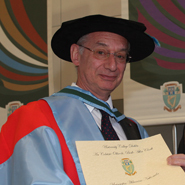Raymond Dwek
 TEXT OF THE INTRODUCTORY ADDRESS DELIVERED BY PROFESSOR PAULINE RUDD, Conway Institute of Biomolecular and Biomedical Research, University College Dublin on 16 June 2010, on the occasion of the conferring of the Degree of Doctor of Science, honoris causa on RAYMOND DWEK
TEXT OF THE INTRODUCTORY ADDRESS DELIVERED BY PROFESSOR PAULINE RUDD, Conway Institute of Biomolecular and Biomedical Research, University College Dublin on 16 June 2010, on the occasion of the conferring of the Degree of Doctor of Science, honoris causa on RAYMOND DWEK
Raymond Dwek’s vision opened up a new field of science. By extending the chemistry of sugars into an understanding of their roles in biology he invented the term ‘Glycobiology’ which entered the Oxford English Dictionary in 1992. In 1994, he was awarded the 7th Wellcome Trust Award for Biology related to Medicine and was subsequently elected to The Royal Society. The citation pronounced that Dwek was ‘recognised nationally and internationally for fundamental work in Glycobiology, for technical development and research allowing knowledge of oligosaccharides to be placed beside that of proteins and DNA’
Professor Dwek joined Oxford University in 1964. He pioneered the use of magnetic resonance in Biology and in 1965 joined the late Professor Rodney Porter (Nobel Laureate) in the Biochemistry Department. With Porter, Raymond solved the first solution structure of an antibody combining site by assuming (correctly) that the immunoglobulin fold was conserved throughout evolution. In 1985, in a seminal paper, his team demonstrated that a population of at least 32 oligosaccharide structures was associated with the IgG molecule. Further, they showed that in rheumatoid arthritis there was a ‘shift’ in this population. It was the first indication that glycoproteins generally exist as many glycoforms, in which an ensemble of sugars is associated with each glycosylation site.
Raymond Dwek opened up the field of Glycobiology with the help of the US company Monsanto, which awarded him a blue-skies grant of around $50M in 1985. This was the first industrial grant that Oxford University had received in its 950 year history and the success of this partnership led to Monsanto (and Searle) building and funding the Glycobiology Institute. From its inception, Raymond recruited scientists from very different backgrounds to address pressing medical problems. As a member of the UK HIV/AIDS steering committee, he made the Institute the HQ for collaborations between botanists from Kew Gardens, chemists at Oxford, virologists, immunologists, experts in molecular structure and clinicians from Cambridge. The outcome was a clinical trial, which formed the basis of a second generation of drugs for HIV and other viruses.
Raymond and his colleagues then discovered a new drug for glycolipid storage disorders which has worldwide approval for Gaucher’s disease and has been in the clinic for 9 years. He also supported the development of innovative glycan analytical technology, now important for regulating the safety and efficacy of biological drugs. He also demonstrated that glycosylation processing is cell type specific, leading to the first FDA directive on glycosylated therapeutics.
In 1988, Raymond persuaded the University of Oxford to spin off a company, Oxford GlycoSystems. This was the first time the University had held an equity position. The company grew to over 200 employees, became a pharmaceutical company known as Oxford GlycoSciences, and was listed on the London Stock Exchange.
In 2000, Professor Dwek, became head of the Department of Biochemistry. He was responsible for raising the funds and initiating the design and construction of the magnificent £60M building that was completed in 2009. He led the department with distinction, putting the research programmes on a sound footing and setting up joint studentships with many countries.
Raymond Dwek has always seen science as a force for peace and dialogue, initiating programmes to rebuild The Institute of Biochemistry in Bucharest for which he was awarded the Romanian Order of Merit in 2001. Raymond is also Advisor to the President of Ben Gurion University in BeerSheva, Israel, helping to establish the National Institute for Biotechnology in the Negev, which has significant outreach to neighbouring countries, particularly in water research.
He has received many other honours including being elected a Foreign Member of the American Philosophical Society (2006), the Huxley medal (2007) and the Kluge Chair of Technology and Society in 2007 at the Library of Congress. In 2007, he was also elected the President of the Institute of Biology. He provided incisive leadership, merging societies in the UK to create one voice for Biology with around 100,000 members.
The National Institute for BioProcessing Research and Training, of which UCD is a stakeholder, is a major new facility established by the IDA to develop research and training collaborations with pharmaceutical companies. In 2006, Raymond assisted 11 members of the Glycobiology Institute to relocate to Dublin. They came with a rich inheritance of equipment, expertise and experience relevant to NIBRT. We are honoured that Professor Dwek continues to support glycobiology in the unique academic-industrial context that exists in Ireland.
Praehonorabilis Praeses, totaque Universitas,
Praesento vobis hunc meum filium, quem scio tam moribus quam doctrina habilem et idoneum esse qui admittatur, honoris causa, ad gradum Doctoratus in Scientiae; idque tibi fide mea testor ac spondeo, totique Academiae.